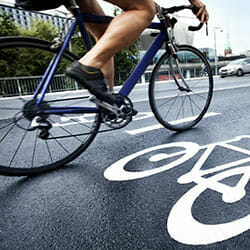
Bike Recalls in Austin, TX
- December 4
- Evans/Reilley
- Bicycle Accidents
In September, 13 bicycle manufacturers recalled more than 1.3 million bicycles in the U.S. for a problem that could cause the bike to stop unexpectedly. On certain bicycle models with disc brakes, the quick-release lever could become entangled with the brake rotor and increase the risk of a crash. It was a problem first identified by Trek, the company that recalled about 900,000 of its bikes in April.
This recall seems remarkably similar to the Takata automotive airbag recall, which began with Honda recalling a few thousand vehicles seven years ago, but as of late November had grown to include more than 23 million vehicles and a dozen automakers.
Both the Takata recall and the bicycle recall involved third-party parts sold to manufacturers, raising questions about who is ultimately to blame when a serious mechanical failure occurs. So far, only six injuries have been associated with the bicycle brake malfunction, but some were quite serious – one rider was paralyzed in a crash.
An article in Gizmodo pointed out that the generic-brand lever that’s causing the brake problems “illustrates how sticky it can be to integrate old and new technology into a single product.” But someone should be responsible for ensuring third-party parts are compatible with a product and that using those parts doesn’t put customers at risk.
Brand Reputation
The quick-release recall involves some of the most respected bicycle brands – Giant, Specialized, and Fuji, to name a few. These brands don’t sell “budget” bicycles; customers have an expectation that they’re paying for quality. But due to the number of bicycle recalls in 2015 among top-selling brands, it’s apparent that a pricey bicycle isn’t necessarily safer.
Here’s a snapshot of some other recent bike recalls:
- Cannondale recalled 23,000 bikes in the U.S. for a steering tube/stem malfunction that could cause riders to fall; the recall included several models, which retailed from about $2,000 to $10,000 (Cannondale bikes were also part of the brake-malfunction recall).
- Kona recalled about 530 bicycles because the fork can break and cause riders to fall; the bikes retailed for about $1,700.
- Wishbone Design Studio recalled about 400 children’s bikes in the U.S. and 4,600 outside the U.S. because the point where the handlebar connects to the bike frame can pinch fingers; of the two injuries known to have occurred, one required stitches and one required restorative surgery; the recycled plastic bikes sold for around $200.
- SRAM, a company that manufactures components for bicycles, recalled about 12,000 of its Zipp wheel hubs, due to a faulty retaining ring that can cause all of the wheel’s spokes to be ejected; the defect caused two accidents that injured riders when their front tires collapsed, with both riders requiring stitches, and one suffering from a concussion; the Zipp hubs were sold for about $215, or as part of a complete wheel that sold for about $920, and five manufacturers sold bikes equipped with the hubs, at a cost of $5,000 to $12,000.
Riding a bicycle is an activity that does have some inherent risk, but riders who are cautious and wear appropriate safety equipment shouldn’t have to worry about a possible catastrophic injury resulting from a mechanical malfunction. It remains to be seen who – if anyone – will be held accountable for injuries caused by faulty components. Maybe this recall will lead to safer manufacturing standards in the future.

 Serving Clients Throughout Texas
Serving Clients Throughout Texas
 Chip Evans is a partner at Evans & Herlihy. Chip brings to the firm more than 20 years of experience as a trial lawyer representing Plaintiffs. It is the desire to help individuals, not corporations, that attracts Chip to this side of the docket. [
Chip Evans is a partner at Evans & Herlihy. Chip brings to the firm more than 20 years of experience as a trial lawyer representing Plaintiffs. It is the desire to help individuals, not corporations, that attracts Chip to this side of the docket. [